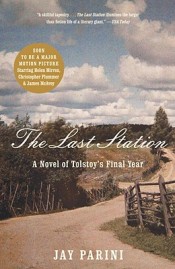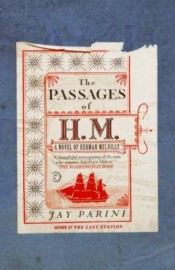 Although I live in a small town in rural Minnesota, we get quite a few lectures and cultural events thanks to our proximity to a small liberal arts college. Back in September, poet and author Jay Parini came to campus to discuss his experimentation with the “biographical novel” in a lecture called “The Imagination of Truth: How Fiction Shines a Light into the Dark Corners of History.” In preparation for his visit, I even read two of his books, but realized this weekend that I’d never actually written up any thoughts on the event or the book I read, The Last Station and The Passages of H.M.. So, here are some very, very belated thoughts.
Although I live in a small town in rural Minnesota, we get quite a few lectures and cultural events thanks to our proximity to a small liberal arts college. Back in September, poet and author Jay Parini came to campus to discuss his experimentation with the “biographical novel” in a lecture called “The Imagination of Truth: How Fiction Shines a Light into the Dark Corners of History.” In preparation for his visit, I even read two of his books, but realized this weekend that I’d never actually written up any thoughts on the event or the book I read, The Last Station and The Passages of H.M.. So, here are some very, very belated thoughts.
The Last Station, a novel about the last year of Leo Tolstoy’s life, is probably Parini’s most famous book, since it was made into a movie in 2009 starring Helen Mirren, Christopher Plummer and Paul Giamatti. The book is told in chapters that alternate points of view from different characters around Tolstoy and explores the different factions trying to lay claim to Tolstoy’s legacy and fortune after his death.
Parini based the book on numerous journals that were kept during this time and maintained many of the events that were recorded, even if he made up some of the details in between. Although Tostoy doesn’t have a chapter in the book, Parini said every quotation attributed to Tolstoy in other characters chapters are words Tolstoy actually spoke or wrote. I really admire that attention and commitment to detail in a book like this one.
 The Passages of H.M. is Parini’s most recent novel about the life of Herman Melville, set again near the end of his life, well past his prime as an author. These sections, narrated by Melville’s wife, Lizzy, alternate with chapters about Melville’s early life traveling the world on whaling ships, escaping to a tropical island, fleeing bisexual cannibals and returning to the United States to be married before sinking into drunken obscurity.
The Passages of H.M. is Parini’s most recent novel about the life of Herman Melville, set again near the end of his life, well past his prime as an author. These sections, narrated by Melville’s wife, Lizzy, alternate with chapters about Melville’s early life traveling the world on whaling ships, escaping to a tropical island, fleeing bisexual cannibals and returning to the United States to be married before sinking into drunken obscurity.
In both of these instances, Parini is writing what he called a “biographical novel,” which he argued can get at some deeper truths than narratives stuck with the facts of history are able to get at. At the same time, Parini also argued that more factually truthful accounts like a biography are also, on some level, a fiction, since every biographer sets out to craft a narrative about the life of a historical figure and inevitably makes decisions about what to include in service of that narrative — Parini called biography “a novel in disguise.” A biographical novel is just explicit about the fictions that are taken.
On some level, I agree with his general argument about the narrative liberties taken in a biography — no book can ever really be a definitive account of a person or their life, even if all of the facts included are true. However, I still think biographical novels leave something to be desired. Whenever I read them, I always want to know what is true, or which events actually happened. Maybe that’s the journalist in me, but I always want those details to ground my reading and my understanding of a story.
Parini doesn’t offer many of those factual details in either one of the books I read and, from what I have in my notes about the lecture, doesn’t really think they’re especially important. He has authors notes in both that mention some slight details about how he wrote each book, but, for me, the notes left a lot of questions about the facts that felt a little unsatisfying.
On the other hand, I agree with Parini’s point that sometimes taking liberties can open a writer up to exploring more about a historical figure than “just the facts” can offer. It’s really a matter of balancing the two and, in my view, being open about those decisions.
In terms of the books, I liked The Last Station much, much more than The Passages of H.M. I thought The Last Station was interesting and a pretty entertaining read — life around Tolstoy at that time was full of drama — and Parini does a nice job building the personalities of the characters around Tolstoy through their diaries. It’s not a thrilling read exactly, but it was enjoyable.
In contrast, I didn’t like The Passages of H.M. Like, really, really didn’t like it. You have to work really hard to make a story with bisexual cannibals boring… and yet this one was. It felt like Parini spent a lot of time trying to show how some of Melville’s philosophies developed to the point of having these plodding and oppressive conversations at times that should have been a romp. It was just difficult to wade through; if you want to read Parini, I’d skip this one.
I don’t end up at a lot of author events or readings, in part because of where I live and in part because I don’t always find them especially fun, but I’m glad I put in the effort to read these books in preparation for his lecture. While I don’t necessarily agree that a biographical novel is a better way of getting at the “truth” of a person, I think it’s an art form that has space along side the really excellent biographies that are being written today.

Comments on this entry are closed.
Wow, I bet this book is pretty fascinating. I use to live 5 minutes from a state university and now about 15 minutes from several private colleges, and its so nice to have access to different speakers, authors, art shows and more that college life offers.
One of the reasons I love the town I live in is because of the college. It’s such a resource for cultural events like this one that a town our size wouldn’t have otherwise.
I’ve read both of these too and liked the Tolstoy one a lot more than the Melville. Although it was long enough ago that I can’t remember exactly why. 🙂 The Tolstoy novel did lead me to read a bio of Mrs. Tolstoy, which was fascinating.
The Last Station definitely made me want to learn more about Tolstoy. Do you happen to remember the biography you read? I’m curious about that one.
I read Sophia Tolstoy by Alexandra Popoff. Really interesting. After reading that, I got a copy of her diaries, but I haven’t tackled them yet.
I literally laughed out loud, Kim, when I read this: “You have to work really hard to make a story with bisexual cannibals boring …” That IS quite an indictment of this book. I do want to read The Last Station, though, because I enjoyed the film adaptation.
I went to a book discussion group about that one, and I think that idea was something that came out of a group of us all complaining about the book. It was just so surprising to me that a book could take a life as exciting as Melville’s was (at points, anyway), and make it feel plodding. I haven’t seen The Last Station yet, but it’s in my Netflix queue for sometime when the boyfriend and I can watch it. I’m glad it’s good!
I enjoy biographical novels, but I know what you mean about wanting to know what’s true. I think they can be interesting ways to explore gaps in what we know about a historical figure’s life, and perhaps to play with some theories. That said, I usually end up liking the ones that are more factual than speculative. Either way, I always like it when authors include details in their notes, which it sounds like Parini didn’t do.
Yes, absolutely. I think that’s a bit of what Parini was getting at when, in his lecture, he tried to make some distinctions between factual truth and emotional truth, and what types of books work better for each. But, like you said, I like my historical fiction heavy on facts and with good notes.
I agree with you completely about wanting to know what’s true and what isn’t! I don’t mind an author taking liberties in the name of a better story, but I like to know when that’s happening 🙂